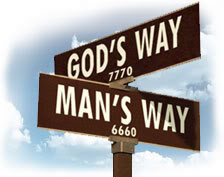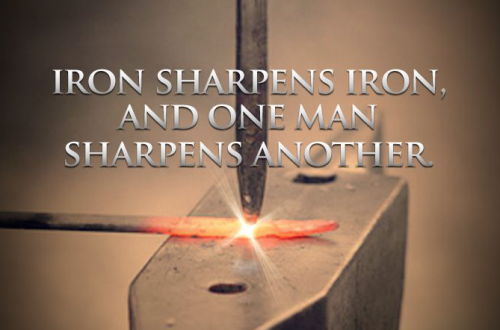
God’s Thoughts and Ways – Part I (Jeroboam)
God thinks and does things differently than we think and do (Isaiah 55:8,9). However, we are commanded to learn to think as God thinks and learn to understand His ways (Romans 12:2).
God has given us the Helper – the Holy Spirit (1) to learn God’s thoughts and ways (1 Corinthians 2:9-16).
Furthermore, we have the Old Testament that is full of “case studies” to learn God’s thoughts and ways (Romans 15:4)
We will examine one of these case studies that occurred during the time of King Jeroboam (Circa 930-909 B.C.). Recall that after King Solomon died, the nation of Israel split into two different nations. Rehoboam, Solomon’s son, had become King but refused to listen to the wise counsel of the older men (1 Kings 12; 2 Chronicles 10). Instead, he chose to listen to the council of men that were young and inexperienced. Realize, God has given us guidance in the New Testament for the selection of our overseers to prevent immature leaders from ruling over us (1 Timothy 3:1,6). It takes maturity (1), which comes from obedience to God over time, for the position not to possess you.
Rehoboam’s sin resulted in the division of Israel with ten tribes to the North and Judah with two tribes to the South. However, the Northern ten tribes did not have a place to worship since Jerusalem was located in Southern Judah. Consequently, King Jeroboam was afraid that his ten tribes would return to Judah to worship and be influenced to join King Rehoboam’s side. To counter this fear, Jeroboam established two new sanctuaries in Northern Israel with golden idols in the form of calves. He called these idols God (Elohim), the name almost exclusively reserved in the Bible to refer to the one true God. However, this is partial obedience to God’s command to worship Him. These altars accelerated Israel’s turning from God and ultimately annihilated the ten tribes of the northern nation.
We enter this story in this Old Testament soon after King Jeroboam has built the new sanctuaries with the golden calves.
Jeroboam inaugurated a festival on the fifteenth day of the eighth month, like the festival celebrated in Judah. On the altar in Bethel he offered sacrifices to the calves he had made. In Bethel he also appointed priests for the high places he had made. On the fifteenth day of the eighth month (a date he had arbitrarily chosen) Jeroboam offered sacrifices on the altar he had made in Bethel. He inaugurated a festival for the Israelites and went up to the altar to offer sacrifices. (1 Kings 12:32–33 NET)
God has spoken to a “man of God” and ordered him to deliver a message to wicked King Jeroboam. The man of God arrives while Jeroboam is offering a sacrifice on his golden calf alter. The man of God delivers the message of God’s judgment with a pronouncement of God’s sign that it would come to pass.
Just then a prophet from Judah, sent by the Lord, arrived in Bethel, as Jeroboam was standing near the altar ready to offer a sacrifice. With the authority of the Lord he cried out against the altar, “O altar, altar! This is what the Lord says, ‘Look, a son named Josiah will be born to the Davidic dynasty. He will sacrifice on you the priests of the high places who offer sacrifices on you. Human bones will be burned on you.’ ”That day he also announced a sign, “This is the sign the Lord has predetermined: The altar will be split open and the ashes on it will fall to the ground.”When the king heard what the prophet cried out against the altar in Bethel, Jeroboam, standing at the altar, extended his hand and ordered, “Seize him!” The hand he had extended shriveled up and he could not pull it back. The altar split open and the ashes fell from the altar to the ground, in fulfillment of the sign the prophet had announced with the Lord’s authority. (1 Kings 13:1–5 NET)
King Jeroboam was angered by the pronouncement of judgment and sought to harm the man of God. The king learned a hard lesson – those in charge, those anointed by God, cannot harm God’s servants without retribution from God (1 Chronicle 16:21,22. Psalms 105:14,15. 2 Thessalonians 1:6).
The king pled with the prophet, “Seek the favor of the Lord your God and pray for me, so that my hand may be restored.” So the prophet sought the Lord’s favor and the king’s hand was restored to its former condition. (1 Kings 13:6 NET)
The king’s hand becomes stiff and his heart becomes supple! He would now like to befriend the man of God. Next, we have revealed the orders God initially gave to the man of God.
The king then said to the prophet, “Come home with me and have something to eat. I’d like to give a present.” But the prophet said to the king, “Even if you were to give me half your possessions, I could not go with you and eat and drink in this place. For the Lord gave me strict orders, ‘Do not eat or drink there and do not go home the way you came.’ ” So he started back on another road; he did not travel back on the same road he had taken to Bethel. (1 Kings 13:7–10 NET)
In summary, the orders from God to the man of God:
- He was not to eat or drink until the assignment was completed.
- The assignment included going to visit the King one way, delivering the message of judgment and returning home via a different path.
So far, the man of God is modeling obedience. He has gone to the King, delivered the message, and returned via a different path and has not eaten or drunk. King Jeroboam has seen two signs of God’s wrath against his idolatry (i.e., the golden calf alter is broken, and his hand was withered and then restored by God). We would think that the mission is accomplished, but not God. His ways are not our ways…
Now there was an old prophet living in Bethel. When his sons came home, they told their father everything the prophet had done in Bethel that day and all the words he had spoken to the king. Their father asked them, “Which road did he take?” His sons showed him the road the prophet from Judah had taken. He then told his sons, “Saddle the donkey for me.” When they had saddled the donkey for him, he mounted it... (1 Kings 13:11–13 NET)
An old prophet enters the story – realize age alone is not the maker of godly character. Again, it is a lifestyle of obedience to God over time that yields the character of Christ. This old prophet is enamored upon hearing of the man of God’s acts. Perhaps hubris is working in his life, and he wants to save face. After all, why did God not call on him to deliver the message to the king? A spiritual vulture, swooping down on the fresh move of God to use it to build up his ministry, not the Lord’s. These types live to steal the works of God in others so they can perpetuate their “God resisted” ministry (James 4:6. Psalms 127:1. Acts 8:18-23). They are Jacob’s, tricksters, and ones in whom there is much guile!
...and took off after the prophet, whom he found sitting under an oak tree. He asked him, “Are you the prophet from Judah?” He answered, “Yes, I am.” He then said to him, “Come home with me and eat something.” But he replied, “I can’t go back with you or eat and drink with you in this place. For the Lord gave me strict orders, ‘Do not eat or drink there; do not go back the way you came.’ ” (1 Kings 13:14–17 NET)
The old prophet attempts to befriend the man of God for his own gain. The man of God holds fast to his orders. However, why is the man of God sitting down while the orders from God have not been completed? Here is the first indication that all is not well within the man of God. David declared the pattern of those being led away from the narrow road of Christ and have stopped running the race set before us (Matthew 7:13,14. Hebrews 12:1-4. 1 Corinthians 9:24). Those that leave this path start walking, then standing, and finally sitting (Psalms 1:1).
The old prophet then said, “I too am a prophet like you. An angel told me with the Lord’s authority, ‘Bring him back with you to your house so he can eat and drink.’ ” But he was lying to him. (1 Kings 13:18 NET)
Perhaps when the old prophet called the man of God a prophet, his heart was opened up for the seduction. Maybe the old prophet chooses to lie, perhaps believing that the end justifies the means. Be wary of those that call themselves prophets with pride in their voice (2 Corinthians 11:13,14,15). A genuine prophet knows the burden that goes along with an office of God (1 Corinthians 4:9,10).
So the prophet went back with him and ate and drank in his house. (1 Kings 13:19 NET)
The old prophet convinces the man of God to alter his orders from God based on a lie. Remember, the Bible instructs us to not listen to someone (e.g., prophet, preacher, teacher, etc.) even if what they say comes true if they are asking us to do things that are not in line with what God has said or is saying (Deuteronomy 13:1-4.). Juxtaposed to Nehemiah, who demonstrated proper discernment when his enemies tried to stop him from rebuilding Jerusalem’s wall (i.e., doing what he clearly knew God had asked him to do (Nehemiah 6:1-14)). Let us learn from this account that If God calls us to do something, we need to complete it and not allow ourselves to be taken from the assignment by something that sounds good but may not be from the Lord (Proverbs 14:12;16:25). If someone brings another word, then we need to take it to the Lord for validation (1 Corinthians 14:29)
Let us stop here and evaluate the performance of these men from a human point of view:
Man of God:
- Charge – Guilty of not completely obeying God’s orders. However, this was after successfully completing the major parts of the assignment (going before a king to pronounce God’s judgment – impressive!). Furthermore, it was after an old prophet, who lacked Christlike character seduced him.
- Judgment –based on extenuating circumstances, the man of God should receive counseling and then have the minor infractions overlooked.
Old prophet:
- Charge – Guilty of lying and seducing the man of God into partially obeying God’s orders for his own selfish gain.
- Judgment – He should be removed from the office of a prophet!
Now let us see what God’s Word says:
While they were sitting at the table, the Lord spoke through the old prophet and he cried out to the prophet from Judah, “This is what the Lord says, ‘You have rebelled against the Lord and have not obeyed the command the Lord your God gave you. You went back and ate and drank in this place, even though he said to you, “Do not eat or drink there.” Therefore your corpse will not be buried in your ancestral tomb.’ ” When the prophet from Judah finished his meal, the old prophet saddled his visitor’s donkey for him. As the prophet from Judah was traveling, a lion attacked him on the road and killed him. His corpse was lying on the road, and the donkey and the lion just stood there beside it. Some men came by and saw the corpse lying in the road with the lion standing beside it. They went and reported what they had seen in the city where the old prophet lived. When the old prophet who had invited him to his house heard the news, he said, “It is the prophet who rebelled against the Lord. The Lord delivered him over to the lion and it ripped him up and killed him, just as the Lord warned him.” (1 Kings 13:20–26 NET)
Now let us review God’s judgment on these two men:
Man of God:
- Charge – Guilty of not completely obeying God’s orders.
- Judgment – termination of ministry and forfeiture of life.
Why is God so harsh in His judgment on the man of God? God was setting an exclamation point on the man of God’s message to King Jeroboam:
Partial Obedience is Not Obedience at All!
Old Prophet:
- Charge – Guilty of lying and seducing the man of God.
- Judgment – must live with the fact that his pride caused the death of a man of God and dissolution of his ministry. (Ezekiel 3:20) He will retain his office as a prophet. Brokenness will have its perfect work (Matthew 21:44).
The conclusion of the story from God’s Word:
He told his sons, “Saddle my donkey,” and they did so. He went and found the corpse lying in the road with the donkey and the lion standing beside it; the lion had neither eaten the corpse nor attacked the donkey. The old prophet picked up the corpse of the prophet, put it on the donkey, and brought it back. The old prophet then entered the city to mourn him and to bury him. He put the corpse into his own tomb, and they mourned over him, saying, “Ah, my brother!” After he buried him, he said to his sons, “When I die, bury me in the tomb where the prophet is buried; put my bones right beside his bones, for the prophecy he announced with the Lord’s authority against the altar in Bethel and against all the temples on the high places in the cities of the north will certainly be fulfilled.” (1 Kings 13:27–32 NET)
The Lord’s announcement by the mouth of the prophet fulfilled. Three centuries have passed, but God’s word comes true because it cannot fail. (Isaiah 55:11. John 10:35)
He [King Josiah (Circa 640-609 B.C.)] also tore down the altar in Bethel at the high place made by Jeroboam son of Nebat, who encouraged Israel to sin. He burned all the combustible items at that high place and crushed them to dust; including the Asherah pole. When Josiah turned around, he saw the tombs there on the hill. So he ordered the bones from the tombs to be brought; he burned them on the altar and defiled it. This fulfilled the Lord’s announcement made by the prophet while Jeroboam stood by the altar during a festival. King Josiah turned and saw the grave of the prophet who had foretold this. He asked, “What is this grave marker I see?” The men from the city replied, “It’s the grave of the prophet who came from Judah and foretold these very things you have done to the altar of Bethel.” The king said, “Leave it alone! No one must touch his bones.” So they left his bones undisturbed, as well as the bones of the Israelite prophet buried beside him. (2 Kings 23:15–18 NET)
Why was God so lenient in His judgment on the old prophet? The old prophet had a character flaw; however, he had not violated a personal order from God. Perhaps deceived into lying similarly to Eve deceived into eating the forbidden fruit (2 Corinthians 11:3. Acts 17:30).
Similarly, many think that their being and doing mostly good things in this life will get them into Heaven after they die. However, this is partial obedience, for God has declared that there is only one way into Heaven after death…. accepting the Lord Jesus Christ as Savior (1). Anything else will result in the non-lenient judgment for disobedience of spending eternity in Hell (1) (Luke 6:46).
Our ways are not God’s ways… (Isaiah 55:8,9), but they will be… (1 John 3:2. 1 Corinthians 13:12. Revelation 22:4).
God’s Thoughts and Ways Series:
- God’s Thoughts and Ways – Part I (Jeroboam)
- God’s Thoughts and Ways – Part II (Paul)
- God’s Thoughts and Ways – Part III (Lazarus)
- God’s Thoughts and Ways – Part IV (Balaam)
- God’s Thoughts and Ways – Part V (King Saul)
- God’s Thoughts and Ways – Part VI (Abel and Cain)
- God’s Thoughts and Ways – Part VII (National Judgment)
- God’s Thoughts and Ways – Part VIII (Joseph)
- God’s Thoughts and Ways – Part IX (Peter)
- God’s Thoughts and Ways – Part X (Invitation, Refusal, Banishment)
- God’s Thoughts and Ways – Part XI (Mary Mother of Jesus)
- God’s Thoughts and Ways – Part XII (Zipporah, Wife of Moses)
Shalom
(Security, Wholeness, Success)
Peace
Then he said to them, “Therefore every expert in the law who has been trained for the kingdom of heaven is like the owner of a house who brings out of his treasure what is new and old.” (Matthew 13:52 NET)
(1) Select the link to open another article with additional information in a new tab.



